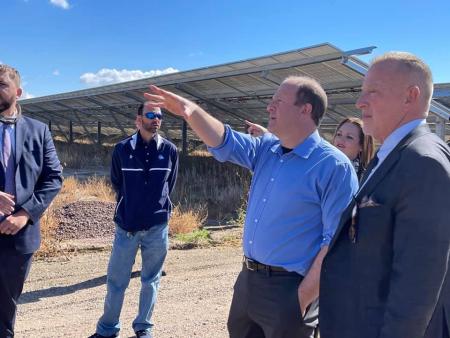Colorado is committed to 100% net-zero greenhouse gas emissions by 2050, and we are making considerable progress towards this goal. Renewable energy is now the least expensive source of electricity, and by 2030, more than 80% of our electricity will come from renewable sources. To continue this momentum, protect all Coloradans and help communities thrive, the Polis Administration is focusing on three pillars.
Mitigate Adapt Transition Equitably
The State of Colorado:
Is leading the way on climate commitments with a net-zero GHG emissions target by 2050.
Signed a first in the nation multi-state partnership to work on removing carbon emissions through direct air capture with Wyoming.
Is fourth in the nation (and first outside the coastal U.S.) in comprehensive, economy-wide climate coverage, according to the research group RMI.
A Roadmap to the Future
In 2021, the Polis Administration developed the Colorado Greenhouse Gas Pollution Reduction Roadmap to specifically identify a comprehensive set of administrative, regulatory, and legislative actions to reduce emissions in Colorado. The Roadmap is a science-based, ambitious, and substantial plan for climate leadership, pollution reduction, and clean energy transition. The state is now working on an updated version of the Roadmap to continue this work and expand access to billions of dollars in federal programs.
Key Priorities
Reduce greenhouse gas emissions to net zero by 2050 to prevent further warming.
In 2023, Colorado set science-based greenhouse gas emissions reductions targets of 26% by 2025, 50% by 2030, and 100% by 2050 (compared to 2005 levels).
The state is taking action across all sectors of the economy in ways that will protect public health, reduce air pollution, and save money. These efforts will protect consumers and businesses from swings in energy prices and open up enormous economic opportunities, including billions of dollars of new investments.
Help Colorado communities adapt to the impacts of climate change and become more resilient.
Adaptation aims to anticipate and manage risks to make communities resilient and prepared to handle a changing climate. Colorado is taking a proactive approach for the durability and health of all state residents, natural systems and wildlife, water resources, and economic sectors.
Climate change increases risks from wildfires, floods, extreme heat, and drought. State, regional and local partners work together to prepare for accelerating risks by deploying new energy projects, improving safety and performance of buildings, expanding community-based resources and emergency response, ensuring careful stewardship of Colorado’s natural resources, and advancing tools to monitor and respond to the impacts of climate change.
Address climate change in ways that consider the needs, strengths, and insights of impacted communities and also provide solutions that improve health and economic conditions across the state.
Recognizing that climate change disproportionately impacts some communities, the State of Colorado is working to ensure that climate policies and programs promote environmental justice and a just transition.
Communities of color and low-income residents are more vulnerable to extreme heat, rising energy bills, and wildfire smoke. They may live in more polluted areas with older, less energy-efficient housing, or may lack access to adequate healthcare or resources for rising costs and repairs in the wake of a natural disaster. Communities traditionally economically dependent on coal may see a rapid decline in tax base and jobs, and benefit from support in a just transition.
Solving the climate crisis is a wildly important goal.
Wildly Important Goals (WIGs) are the Governor’s statewide priorities with annual goals set by the directors of the state’s executive branch agencies. Climate-related WIGs focus on increasing renewable energy across the state, reducing greenhouse gas emissions from the transportation and buildings sectors, expanding electric vehicle registrations, and more. More information on strategies to achieve WIGs and their progress can be found on the Governor’s Dashboard.

